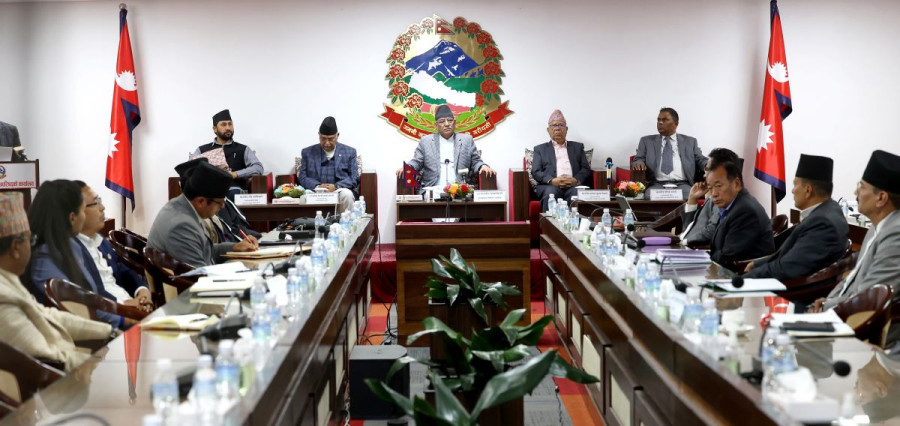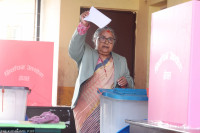Politics
Ruling five-party alliance unveils an ambitious ‘vision statement’
If this coalition fails to deliver, the nation will slip into crisis, warns Prime Minister Pushpa Kamal Dahal.
Post Report
The five ruling parties on Tuesday unveiled an ambitious set of minimum policy priorities and a joint resolution, which is regarded as the government’s vision statement.
At a function at the Prime Minister Office, CPN-UML Vice-chairman Bishnu Poudel read out the government’s policy priorities and joint resolution that encompass corruption control, land management, forestry, climate adaptation and disaster management, among other things.
The preamble of the vision paper states that the government pledges to combat activities that undermine the constitution and its spirit; strengthen the federal democratic republic; and will restore trust and hope among the people by addressing the current economic lethargy, impunity and frustration among professionals.
It also vows to change the negative sentiments, frustration and anger among the youth and work to protect all past achievements made through various struggles. It underscores the government's commitment to prioritising sovereignty, territorial integrity, and fostering robust and balanced international relations.
The statement addresses youth and sports, tourism, culture, and social harmony, and emphasises women’s participation, empowerment and social inclusion. Further, it commits to address transitional justice, bring sustainable peace, and defend national interests through an independent foreign policy, among other crucial issues.
The preamble of the document titled ‘Minimum Policy Priorities and Common Resolution’ states that the coalition government is committed to instilling hope and confidence among the people by tackling pressing issues like economic downturn and impunity.
It emphasises the urgency to complete outstanding tasks related to the peace process. Additionally, it commits to provide medical treatment, jobs, and rehabilitation to individuals who suffered disabilities during the conflict period (1996-2006). Furthermore, it highlights the necessity of fulfilling the tasks related to compensation, rehabilitation, and reintegration of conflict-hit families.
The common minimum programme includes a commitment to uphold the integrity of financial institutions; improve public infrastructure; promote good governance through efficient service delivery; boost employment, entrepreneurship and domestic production; and coordinate the development of physical infrastructure.
The vision document proposes amending various laws to attract investment, implementing employment-friendly policies, and work towards addressing issues such as slow credit flow, low capital expenditure, and achieving a balance between fiscal and monetary policies.
It also suggests reducing the widening gap between revenue and public expenditure by improving revenue collection, adopting austerity measures, seeking new sources of foreign aid, channelling remittances into productive sectors and making policy changes in the share market.
The statement talks about receiving the green fund, preparing interim and transitional strategies after graduating from the least developed country category in 2026, and emphasises structural transformation in sectors like digitalization, tourism, agriculture, energy, and green industrialisation to generate employment.
It also calls for removing the anomalies in various financial institutions, addressing challenges related to implementing federalism, improvement in service delivery, promotion of good governance, revising laws that are hampering professional environment, enhancing coordination among state organs through technology, and enacting laws to promote inclusiveness, secularism and implementation of federalism in order to ensure effective governance at all levels.
The vision paper proposes a high-level commission to ensure a fair and speedy justice delivery system. Similarly, it suggests forming a task force comprising experts to recommend reforms in public administration, security agencies and public enterprises.
In order to do away with the belief that public office bearers are corrupt and inefficient, the government will work to establish a system of accountability in public administration, judiciary and regulatory bodies, so that those who make mistakes will be punished.
The vision paper also proposes amending the present performance management contract between the political and administrative leadership, promoting the use of the national identity card, and strengthening the Nagarik App to streamline service delivery without the need of multiple documents. It also talks about bringing policy and institutional reforms in public procurement.
The policy paper also vows to strengthen regulatory bodies like the Commission for the Investigation of Abuse of Authority by providing them additional legal support, manpower, resources and equipment to combat corruption. “Corruption and abuse of authority will be investigated and legal proceedings will be initiated to ensure that corrupt people face legal consequences sooner or later.”
The paper also stresses boosting domestic production to increase local capital, promoting agriculture as a tool for economic development, job creation, poverty alleviation and industrialisation, and promises to launch a ‘Make in Nepal’ campaign.
The vision paper of the five ruling parties proposes establishing an employment bank, startup fund, and business incubation centre, and advocates for campaigns like ‘make in Nepal’ and ‘made in Nepal’.
It also discusses promoting gig economy among the youth, launching youth-focused skills program in every local unit, management of land through a land bank, mobilising capital through local banks and financial institutions, ensuring farmers have access to chemical fertilisers and agricultural equipment, prioritising businesses and industries that can reduce imports, and reviving sick businesses through public-private partnerships.
The paper also talks about free and compulsory education for all, safeguarding labour rights, prioritising the welfare of peasants, workers, and marginalised communities, and calls for addressing problems faced by universities.
Furthermore, the paper discusses improving the health sector, expanding insurance coverage, setting up a National Accreditation Centre, ensuring social security and expanding its coverage, expanding the road network and connectivity, setting up a public transport management authority, exploring alternative resources for investment in infrastructure, and launching a national infrastructure development programme.
It also discusses energy security, developing an integrated energy policy, promotion of alternative energy, building infrastructure in information and technology, scientific use of land, digitisation of land records, addressing various land-related issues including landless people, and giving utmost priority to efforts at mitigating climate change.
The document also pledges to adopt a balanced, neutral and non-aligned foreign policy. It pledges to employ effective diplomacy in order to reclaim Nepali territories like Limpiydhura, Kalapani, Lipulek and Susta.
“If this alliance is unable to work, the country will face a crisis,” said the prime minister after unveiling the vision paper. “This alliance was formed to instil hope among the people.”
The vision document was drafted by a task force comprising Paudel and Bishnu Rimal from the CPN-UML, Barshaman Pun and Janardan Sharma from the CPN (Maoist Centre), Swarnim Wagle and Mukul Dhakal from the Rastriya Swatantra Party, Rajendra Shrestha and Manish Suman from the Janata Samjbadi Party, and Pramesh Hamal and Ghanashyam Bhusal form the CPN (Unified Socialist).




 19.87°C Kathmandu
19.87°C Kathmandu












